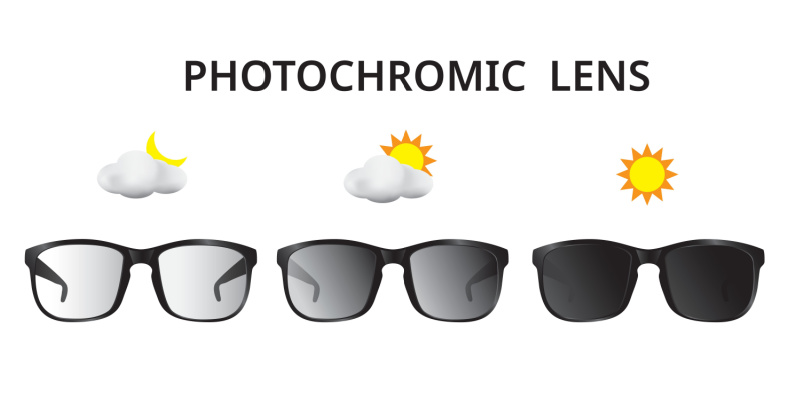Photochromic Lenses And Polarised Sunglasses – Are They Worth It?

Summer is just around the corner, so it’s time to make sure your eyes are well protected. We often get asked about the differences and benefits of photochromic lenses for glasses and polarised sunglasses, so we’re here to answer your questions about whether these specialist lenses are worth it and are right for you.
Polarised Sunglasses

When it comes to buying new sunglasses, an important decision to make is whether to opt for polarised lenses or not. First, let’s answer the question, what are polarised lenses? In simple terms, they are equipped with a special coating that helps block horizontally polarised light, significantly reducing glare and providing better clarity of vision and contrast, particularly on bright days.
Glare caused by the sun’s reflection off flat surfaces like metal, water, glass, or anything bright can lead to squinting, compromised vision and even headaches and eye strain. Polarised sunglasses prove to be especially beneficial for activities such as driving or if you spend time on or near water. However, their advantages go beyond that. You’ll also notice that colours become more vivid and vibrant, offering an improved view of your surroundings.
There are a couple of factors to keep in mind. Polarised sunglasses are not suitable for night driving, and they may distort LCD screens such as phones and sat navs.
Photochromic Lenses

Light-reactive lenses, also known as photochromic lenses for glasses, automatically darken when exposed to sunlight. They contain special molecules that react to UV rays, absorbing light and darkening into sunglasses. When you step back indoors, the reaction to the molecules adjusts back swiftly changing the lenses back to clear.
At our practice, you can experience the advanced Sensity photochromic lenses from one of the leading glasses lens suppliers worldwide, Hoya. These offer not only full UV protection but also exceptional visual clarity in any light conditions. Say goodbye to the need for separate sunglasses if you wear prescription glasses. Sensity lenses adapt swiftly, darkening when spending time outdoors and reverting to clear indoors. Keep in mind not all light-reactive lenses are effective in cars due to the windscreen’s UV filtration.

Image source: Supplied by Hoya
What’s the Verdict?
Are polarised lenses worth it? Are light-reactive lenses right for you? The answer depends on your lifestyle and needs. Photochromic lenses may be the way to go if you spend a lot of time outdoors and want glasses that adjust to different light conditions. Polarised lenses are great for reducing glare from reflective surfaces, making them ideal for water sports or driving. Ultimately, it comes down to personal preferences and lifestyle needs.
We think both these lens types are highly beneficial and encourage you to book an appointment with our optometrist in Whitley Bay to discuss which type of lenses are best for you.
